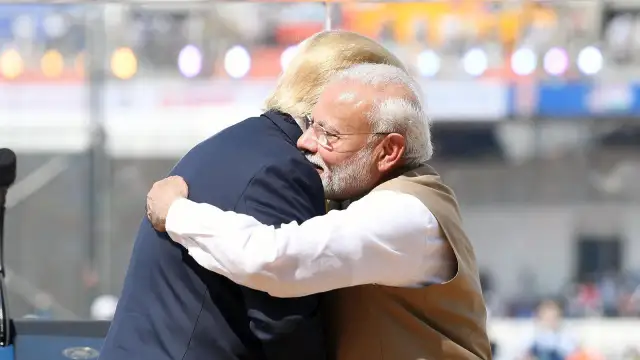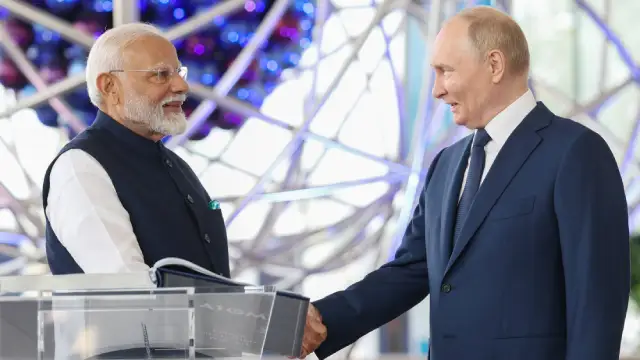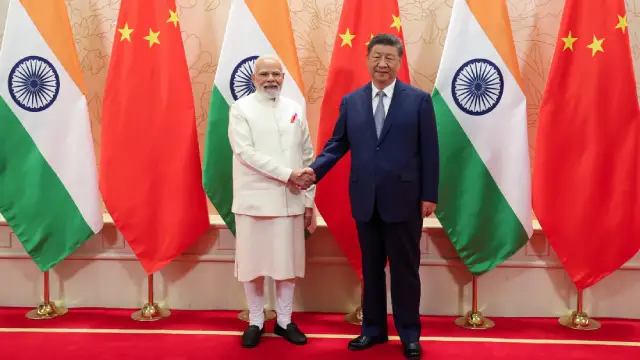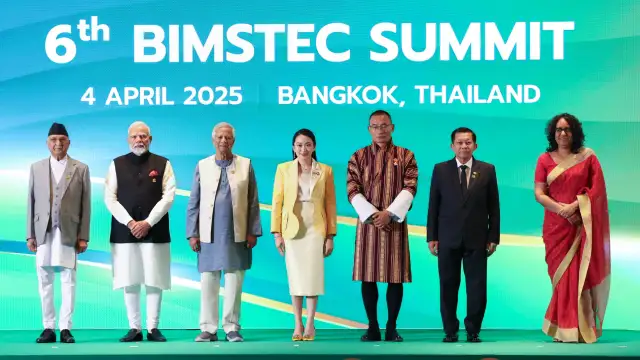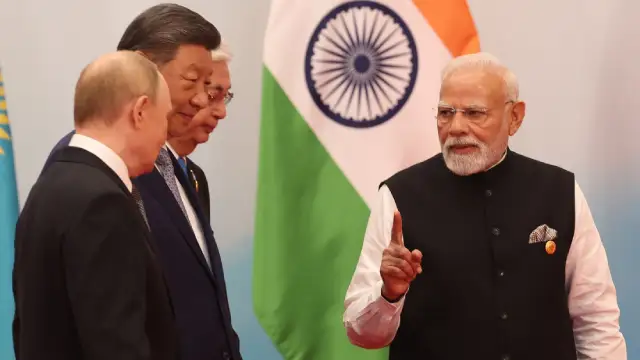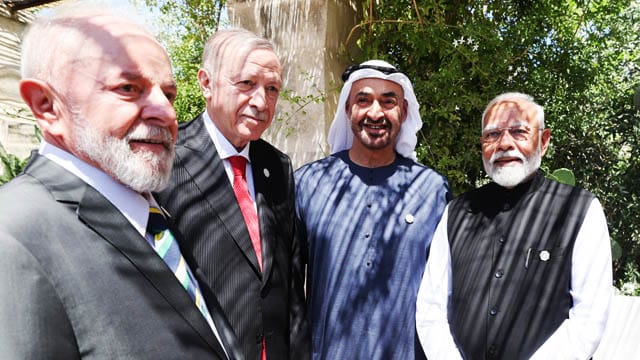Benjamin Netanyahu‘s recommendation of Donald Trump for the Nobel committee last month seemed like standard diplomatic theatre. Yet for one world leader, the American president’s pursuit of the Peace Prize has become a source of deep anxiety.
Narendra Modi, who has built his political career on uncompromising Hindu nationalism, now faces an extraordinary predicament—his supposed ally’s bid for global recognition threatens to destroy the very foundation of his domestic appeal.
The octogenarian American president’s Nobel ambitions gained official backing on Thursday, July 31st, when the White House confirmed his candidacy.
Despite launching attacks on Iran and Yemen after taking office, Mr Trump’s Peace Prize campaign has received formal endorsement from his own administration, creating an uncomfortable reality for the Indian prime minister, who once called him a friend.
White House makes it official
White House Press Secretary Karoline Leavitt delivered the announcement that would send shockwaves through New Delhi’s corridors of power. “President Trump has now ended conflicts between Thailand and Cambodia, Israel and Iran, Rwanda and the Democratic Republic of the Congo, India and Pakistan, Serbia and Kosovo, and Egypt and Ethiopia,” she declared. “It’s well past time that President Trump was awarded the Nobel Peace Prize,” the press secretary added.
The list reads like a diplomatic triumph for Mr Trump. Critics may question the committee’s alleged bias towards the US-Israel nexus, but for Mr Modi, Ms Leavitt’s words represent a political catastrophe in the making.
The casual mention of “India and Pakistan” among Mr Trump’s supposed peacemaking achievements strikes at the heart of Mr Modi’s carefully constructed image as an uncompromising defender of Indian sovereignty.
Nationalist’s impossible trap
Mr Modi’s political invincibility in India rests on a single pillar—Hindutva-inspired hyper-nationalism.
For 11 years, despite dismal economic performance, he has maintained power by positioning himself as the ultimate Hindu nationalist, fighting Islamic aggression and emerging victorious.
His far-right Bharatiya Janata Party (BJP) and its ideological parent, the Rashtriya Swayamsevak Sangh (RSS), have spent decades building this narrative around Mr Modi’s persona.
Every India-Pakistan conflict becomes an opportunity to reinforce this image.
Mr Modi plays the uncompromising defender of Hindu civilisation against Pakistani terrorism.
His followers expect nothing less than complete victory against Pakistan, China and all other countries they perceive as enemies, achieved through strength and determination.
Foreign mediation, particularly American intervention, represents everything Mr Modi’s nationalist brand opposes.
For Mr Modi’s Hindutva-incensed followers, the US must help India in fighting with its technological and military prowess, but never stop it.
Yet Mr Trump’s repeated claims about brokering the India-Pakistan ceasefire after India launched its much-hyped “Operation Sindoor” have created an impossible situation.
India launched “Operation Sindoor”, apparently to avenge the killing of over 26 tourists and a local in Jammu & Kashmir’s Pahalgam, following a nationwide jingoistic fervour demanding a war against Pakistan.
As the border skirmish unfolded, fake news and propaganda trumpets were amplified by the Hindutva-inclined Indian mainstream press.
Mr Modi’s fans and critics were glued to their screens, irrespective of the device and hooting for the war.
It became the biggest showbiz of the era. Yet, suddenly, the conflict was stopped. There was a ceasefire.
The sudden ceasefire announcement by Foreign Secretary Vikram Mishri, who faced online attacks from RSS and BJP supporters, surprised many of Mr Modi’s ardent followers.
The abrupt end to military operations, just days after they began, raised uncomfortable questions. Trouble started when Mr Trump claimed he brokered a ceasefire between the two nuclear rivals.
Pakistan confirms Trump’s role
The situation deteriorated further when Pakistani officials acknowledged Trump’s mediation efforts.
While BJP leaders and Indian officials vehemently denied any American role, claiming the ceasefire resulted from direct Indo-Pakistani discussions, Pakistan’s confirmation provided devastating ammunition to Mr Modi’s opponents.
The contradiction became impossible to ignore.
If India had independently decided to end military operations, why would Pakistan credit American intervention?
If Pakistan was lying about Mr Trump’s role, why hadn’t Mr Modi explicitly rejected these claims?
The prime minister’s silence began to look like a tacit admission of dependence on American mediation.
Opposition leader Rahul Gandhi seized this opportunity with characteristic directness during the ongoing monsoon session of the Indian Parliament.
In the Parliament’s lower house, he threw down an open challenge to Mr Modi—reject Mr Trump’s claims publicly and call the American president a “liar.”
"If Modi has the courage of Indira Gandhi, then let him say here (in Lok Sabha) that Mr. Donald Trump, you're a liar and you didn't make us ceasefire…."
— Tarun Gautam (@TARUNspeakss) July 29, 2025
Rahul Gandhi is currently ripping the Modi government apart. pic.twitter.com/06KLtck5zu
Only such explicit denial could close the chapter on foreign intervention allegations.
A challenge Modi can’t accept
Mr Gandhi’s challenge placed Mr Modi in an impossible position.
Accepting it would require calling Mr Trump a liar, potentially destroying the relationship with the American administration amid a tariff turbulence.
Rejecting it would confirm suspicions about foreign mediation in Indian military affairs.
Either choice would damage Mr Modi’s carefully cultivated image.
The prime minister has remained trapped by this dilemma throughout the monsoon parliamentary session.
BJP leaders defend the ceasefire while obliquely disputing Mr Trump’s claims, but Mr Modi himself maintains conspicuous silence on the specific challenge.
His inability to directly confront Mr Gandhi’s demand reveals the weakness beneath his strongman facade.
Trump’s Nobel bid escalates the crisis
Ms Leavitt’s announcement about Mr Trump’s Nobel candidacy transforms a domestic political problem into an international embarrassment.
The White House statement officially reaffirms American claims about mediating the India-Pakistan conflict. Mr Trump’s pursuit of the Peace Prize ensures these claims will receive global attention and formal documentation.
The timing proves particularly damaging for Mr Modi.
Mr Trump’s announcement of 25% tariffs on Indian goods has already rattled the administration, allowing opposition parties to question Mr Modi’s foreign policy competence.
The tariff on India is even higher than what’s imposed on neighbouring Bangladesh and Pakistan, putting Mr Modi’s hug and handshake diplomacy to question.
The Nobel nomination adds another dimension to these failures, suggesting that Mr Trump views Mr Modi-ruled India as a client state requiring American management rather than an equal partner.
When nationalism meets reality
The Nobel nomination forces a fundamental question about Mr Modi’s nationalist credentials.
If the controversial Peace Prize committee accepts Mr Trump’s documentation claiming mediation between India and Pakistan, it will create an official record of American intervention in Indian security affairs.
The committee’s deliberations would examine evidence supporting Trump’s peacemaking achievements, potentially including detailed accounts of his intervention in South Asian conflicts.
Mr Modi’s silence on this matter begins to look like acquiescence rather than dignified restraint.
Opposition parties have attacked the government on multiple fronts during the current parliamentary session.
They demand accountability for intelligence failures leading to the Pahalgam terror attack while simultaneously questioning the ceasefire decision.
Mr Modi’s response has been to accuse opposition parties of believing Pakistani narratives over Indian ones, yet he remains mum on the same story peddled by his “friend” Mr Trump.
The prime minister can’t explain why Pakistan and America tell the same story about Mr Trump’s mediation.
The friend becomes a liability
Mr Modi’s foreign policy matrix depends heavily on claiming friendship with Mr Trump’s administration.
Formed during Mr Trump’s first tenure, this friendship’s foundation is their common aspiration to contain China.
Yet this supposed friendship now creates more problems than benefits.
External Affairs Minister S Jaishankar and Mr Modi must either confirm that White House claims are incorrect or accept that India required American mediation to end its military operations.
Neither option serves Mr Modi’s interests.
Contradicting the White House would damage relations with an administration that has already imposed punitive tariffs on Indian exports.
Accepting American mediation would destroy Mr Modi’s nationalist credibility and vindicate Opposition criticisms about his weakness in foreign affairs.
Mr Modi has no way to escape, except for diverting the public attention by creating new SOS narratives.
The Subterfuge Exposed
Mr Modi’s nationalism has long served as cover for implementing neoliberal economic policies that benefit India’s elite while imposing costs on ordinary citizens.
His strongman image allows unpopular economic decisions to proceed without effective opposition.
Mr Trump’s Nobel pursuit threatens to expose this nationalism as theatrical rather than substantive.
If Mr Modi can’t defend India’s right to conduct military operations without foreign mediation, how can he protect the country’s long-term interests?
This question goes to the heart of his political appeal and governing legitimacy.
The prime minister who promised to restore Indian pride and independence now appears dependent on American approval for basic security decisions.
The cruel irony of Mr Modi’s predicament lies in its source.
The man he once embraced as a friend, whose Truth Social platform he eagerly joined, whose administration he courted with embarrassing devotion, now threatens everything Mr Modi has built.
Mr Trump’s pursuit of the Peace Prize, supported by his own White House, may ultimately prove more damaging to Mr Modi’s political survival than any Opposition campaign could achieve.
Join our channels on Telegram and WhatsApp to receive geopolitical updates, videos and more.

